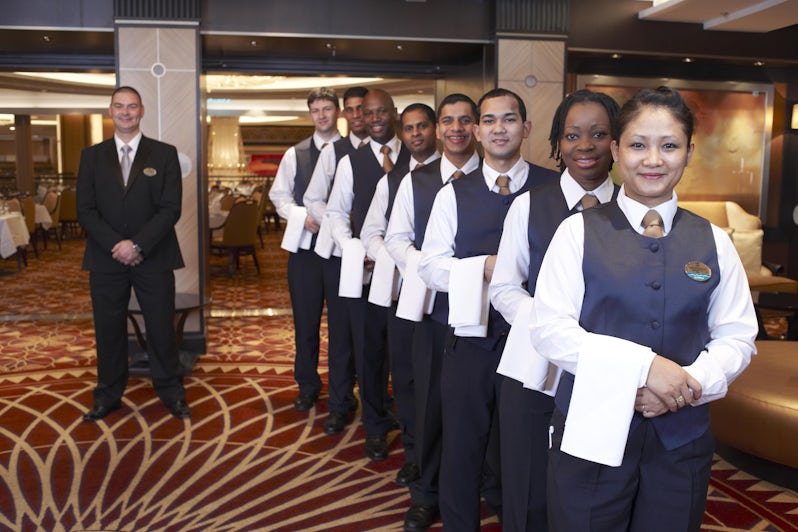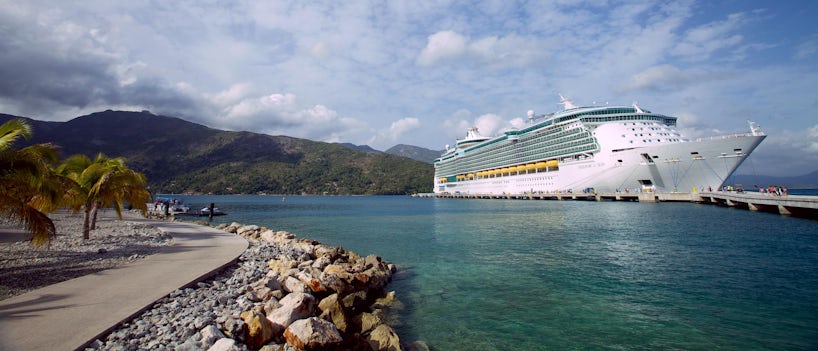
8 Facts You Might Not Know About Working on a Cruise Ship



When you're enjoying your cruise miles away from home, chances are high that you're being looked after by crew members who are also a long way from home. But when you disembark (and can satisfy your homesickness), they will be staying onboard for up to eight months more.
For many cruisers, it sounds like a dream job, but have you ever wondered what it's like working on a cruise ship?
Cruise Critic was provided with a fascinating glimpse into careers at sea, and life behind the scenes, when Royal Caribbean Group let us tour its crew training and housing facility in the Philippines. Here's what we learned, including eight facts about working on a cruise ship you might not know.
1. Cruise Ship Crew Members Have a Lot of Job Opportunities

With the cruise industry continuing to expand, the opportunities for people looking for a career at sea are not going to dry up any time soon. Be it captains or childcare workers, dancers or doctors, chefs or cruise directors, stateroom stewards or spa therapists, each Royal Caribbean ship provides around 450 different types of jobs at various ranks.
In common with other cruise lines, Royal Caribbean operates recruitment programs around the world in countries such as the Philippines, China and Indonesia in order to ensure it always has enough staff to fill its employment needs.
Additionally, the line says that many potential crew members apply for jobs after hearing about employment opportunities from friends and family members who already work for Royal Caribbean, and there is never any danger of a shortage of staff.
2. New Crew Members on Cruise Ships Undergo Months of Training
New cruise ship employees will embark on a residential training course to best equip them with all the tools necessary for a successful career at sea. Courses typically last 13 weeks and are filled with practical and classroom-based sessions, a full overview of the department in which they'll be working and job-specific training. During the course, they take part in individual exercises, activities in groups and in pairs, group discussions and role-play exercises.
These courses are held at a variety of land-based training centers that are focused on different aspects of crew training. For example, Royal Caribbean sends some staff to a dedicated training center for safety, hospitality and catering courses that is situated close to Manila. During the courses, staff are provided with on-site accommodation and all meals.
3. Working on a Cruise Ship Typically Entails Signing Long Contracts
Upon successful completion of their training, crew members are offered a contract, typically ranging from two to nine months. There are no holiday entitlements, but crew members can choose when they take the six- to eight-week break that automatically comes with longer contracts.
In theory, they could work four months, take two months off and then return to the ship for the second segment of the contract, but most choose to work all their required time all in one go.
Although speculation about what cruise ship workers are paid is rife on the Cruise Critic forums, cruise lines do not publicly discuss rates of pay or benefits. However, the fact that cruise ships are attractive places to work can be deduced from the number of employees -- often including many members of the same family -- that work for the same lines for many years.
The cruise lines also provide employees with training that enables them to successfully pursue other jobs when they decide it is time to head back to dry land. For instance, many chefs return home and open their own restaurants.
4. Cruise Ship Crew Members Have Promotion Opportunities

Most new crew ship employees start in entry-level positions, but ambitious cruise ship workers can rise through the ranks. Members of staff are encouraged to embark on regular training courses and apply for promotion -- and there are plenty of success stories.
For example, we met Dennis Logdat, who joined RCCL in 2006 as a commis (apprentice) chef and got promoted to a chef de partie (line cook) and first chef de partie before taking up being a sous chef.
The next rung on the culinary ladder is executive sous chef, which is just one step away from his ultimate goal of becoming the executive, or head, chef on a cruise ship.
5. Working on a Cruise Ship Appears Worthwhile: Employee Retention on Cruise Ships Is High
While not revealing specific figures, Royal Caribbean Group says its employee retention record is above the industry standard and crew members choose to stay with the company rather than jump ship to another line.
In general, employees stick to one Royal Caribbean Group cruise line (such as Royal Caribbean or Celebrity), but some do move across brands. There are many who have clocked 10 or more years of service. Seniority does lead to benefits, such as more flexibility with contracts, getting preference for working on specific ships and career growth opportunities.
6. Cruise Ship Crew Members Get to See the World -- But It's Not a Vacation

It's a common misconception that life on a cruise ship is just one big holiday for staff. Regardless of the role employees take, they can expect to work hard throughout their contract. Crew members work every day of their contract, taking time off in hours rather than in full days.
7. Crew Life Is Often a Family Affair on Cruise Ships
Cruise lines know that happy crew members will stay longer with the company, and give married couples the opportunity to apply for contracts working on the same ship and to share a cabin. Similarly, there are plenty of families who work together on cruise ships (and many apply for jobs after talking to relatives who work in the industry).
8. Cruise Ship Crew Food: The Crew Eats Different Meals from Guests

Much like is the case for cruisers, there's no shortage of food on a cruise ship for crew members. Staff meals are prepared by dedicated crew cooks in a separate galley. These include regional dishes from the crew members' home countries, fast food (think burgers and pizza) and healthy options.
And, in case you're wondering, no -- crew never eat passengers' leftovers. As cruise ship vessels are manned around the clock, crew members have access to their own food and drink 24/7. The terms of their contracts specify break and meal times, so even the busiest crew members will always have set rest breaks when they have time for a snack or main meal.